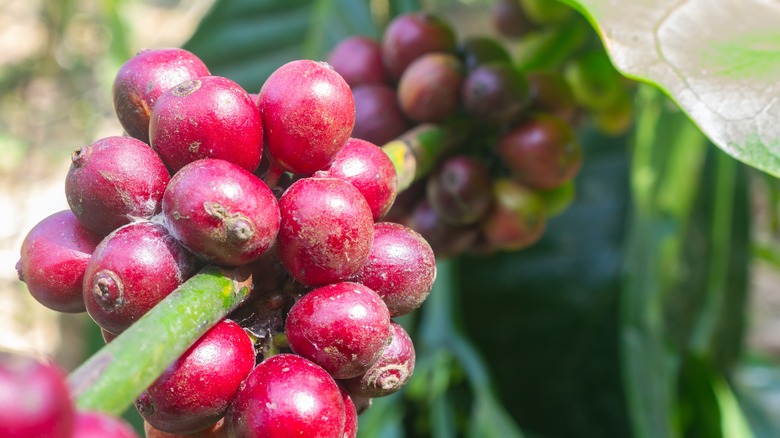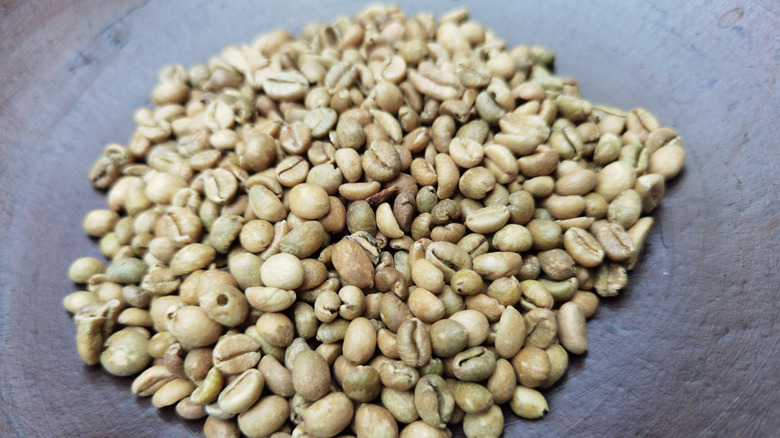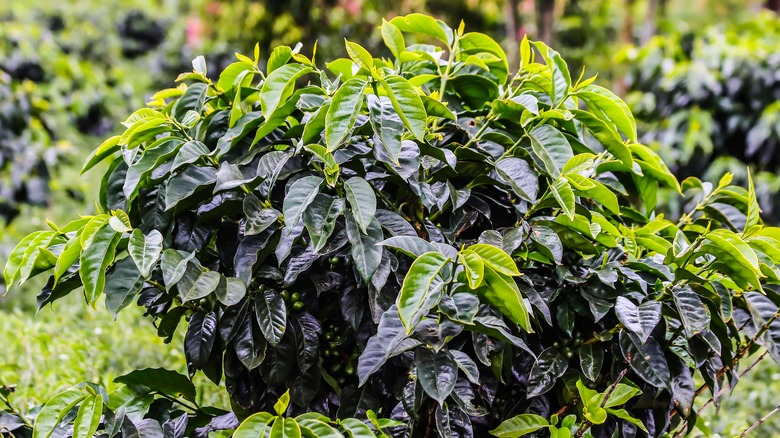What Makes Excelsa Coffee Beans Special
As far as beverages come, few are as complex as coffee. The drink contains over a thousand chemicals responsible for flavor and smell. And if your cup is too bitter, it's probably an error in the preparation process — only 15% of these compounds (most notably caffeine) yield a bitter flavor, notes Science of Cooking. Considering the possibilities of flavor, sampling various coffees is an enthralling task. While often summarized as one shrub, the caffeinating substance actually encompasses nearly 50 species. Most are wild and uncultivated, but three have been favored by humans — Arabica, Robusta, and lesser-known Liberica. Arabica beans dominate the market with a 60% share and garner the most attention from small-batch Speciality Coffee enthusiasts, per Teka.
Yet, in a market that favors the discovery of new flavors and varietals, the lesser-known species also present intriguing characteristics. One such example is Excelsa — a special type of coffee with a debated species status.
The unique characteristics of Excelsa coffee beans
Excelsa is a subvariety of Liberica — the seldom consumed third coffee species. With Arabica and Robusta varieties overwhelmingly spotted on labels of roasted beans, it's no surprise these unique plants garner less attention. Comprising only 7% of global circulation, this type of coffee is mostly grown in Southeast Asia for blends. Yet its flavor is palatable — with a sweet, acidic fruitiness balanced by a dark-roasted undertone, notes Atlas Coffee Club.
Excelsa beans contain less caffeine than their counterpart; Arabica beans clock in at nearly a third more than the alternate per a hundred grams. Instead, the species' greatest asset is its sturdiness. Excelsa trees are resistant to coffee rust, leaf borers, and other infections. Additionally, it can grow at lower altitudes than other coffees– a critical characteristic with rising global temperatures. Yet despite these attractive qualities, some aspects explain Excelsa's relative obscurity. The large coffee trees require a great deal of effort to harvest and maintain. Additionally, unlike Arabica coffees, there's minimal generational knowledge of how to process the beans. Factor in a marketplace with undefined prices and minimal marketing — their mysterious nature becomes more clear, explains Helena Coffee.
Excelsa's unclear species status
Excelsa's botanical murkiness adds to its intrigue. Only first discovered around Lake Chad in 1905, it was considered a unique coffee species for most of its existence. Yet in 2006, the plant was deemed a subvariety of the Liberica plant. The greatest reason is that both Liberica and Excelsa coffee grows on a tree, unlike the other shrub-like species. Both produce asymmetrical fruits, but their shape differs — Liberica beans are more almond-shaped, while Excelsa are small and round.
Since 2006, this murky co-grouping has only complicated marketing the bean. There's little information on farming practices, and even the International Coffee Organization doesn't release any trade statistics on Liberica or Excelsa coffees, per Perfect Daily Grind. Such an indeterminate nature also means Excelsa beans are not sold distinctly. Farmers often group these beans alongside Liberica's, which are later thrown into a blend. While perhaps procured in supermarkets of producing nations, Excelsa beans lack the strong specification of more noted Arabica beans, via The Coffee Guru.
Flavors and preparations of Excelsa coffee
Complicated origins aside, let's dive into the flavors of this coffee. As noted by Perfect Daily Grind, a well-grown and roasted batch will produce a fascinating, delicious cup. With a denser interior, these beans require more heat than Arabica varieties but can still be prepared for a light-medium roast. A taste characteristic of Excesa is wood and popcorn, accompanied by naturally occurring fruit flavors. And once roasted further, the taste shifts to a darker, chocolate-like palate.
Like its taste, the bean's aroma is pungent, which makes the coffee divisive among consumers. Such a quality is why Excelsa is favored in blends — it brings a more intense body, as well as a lingering aftertaste that adds complexity to beans, notes Len's Coffee. Especially when consumed on its own, Excelsa's pungent earthiness doesn't appeal to all coffee drinkers (via Craft Coffee Guru). However, if the opportunity to sample some arises — go for it. There's no other coffee quite like it.



